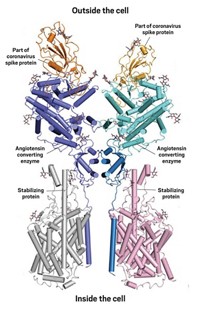Advertisement
Grab your lab coat. Let's get started
Welcome!
Welcome!
Create an account below to get 6 C&EN articles per month, receive newsletters and more - all free.
It seems this is your first time logging in online. Please enter the following information to continue.
As an ACS member you automatically get access to this site. All we need is few more details to create your reading experience.
Not you? Sign in with a different account.
Not you? Sign in with a different account.
ERROR 1
ERROR 1
ERROR 2
ERROR 2
ERROR 2
ERROR 2
ERROR 2
Password and Confirm password must match.
If you have an ACS member number, please enter it here so we can link this account to your membership. (optional)
ERROR 2
ACS values your privacy. By submitting your information, you are gaining access to C&EN and subscribing to our weekly newsletter. We use the information you provide to make your reading experience better, and we will never sell your data to third party members.
Infectious disease
How SARS-CoV-2 stops cells producing protein
Cryo-EM shows how the new coronavirus stops the ribosome producing immune system proteins
by Laura Howes
July 25, 2020
| A version of this story appeared in
Volume 98, Issue 29

The novel coronavirus SARS-CoV-2, cause of the COVID-19 pandemic, has infected millions worldwide, but scientists are still unpacking how infection by SARS-CoV-2 works. Researchers led by Roland Beckmann of Ludwig Maximilian University Munich and Konstantin M. J. Sparrer of Ulm University have now determined how the coronavirus inhibits the synthesis of proteins in infected cells, effectively disarming the body’s innate immune system (Science 2020, DOI: 10.1126/science.abc8665). The team used cryo-EM to image the viral protein Nsp1 in a complex with the human ribosome, the cell’s protein-making factory. The work shows that after Nsp1 binds to the ribosome, one end of the protein inserts into the mRNA entry channel of the ribosome and blocks it, stopping production of immune system proteins. Earlier work had shown that Nsp1 from the virus that causes SARS suppresses protein production, but the mechanism wasn’t clear. Blocking Nsp1 binding without blocking the function of the ribosome could be a good drug target, the researchers say.



Join the conversation
Contact the reporter
Submit a Letter to the Editor for publication
Engage with us on Twitter